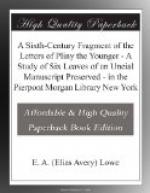[Footnote 1: The letters above the
line are additions by the first,
or by another contemporary, hand.]
[Footnote 2: permiserit:
t stands over an erasure, and original
it seems to be corrected to et,
with e having the rustic
form.]
[Footnote 3: The scribe first wrote
longius se uehi. The e which
precedes uehi was added by him
when he later corrected the page
and deleted se.]
[Footnote 4: uale: The
abbreviation is marked by a stroke above as
well as by a dot after the word.]
{fol. 51r}
.LIBER.III.
A tout ceulz qui ces presentes lettres verront et orront Jehan de sannemeres garde du scel de la provoste de Meaulx & francois Beloy clerc Jure de par le Roy nostre sire a ce faire Salut sachient tuit que par.[1]
.{-C}.PLINIUS.MAXIMO SUO SALUT_EM_
QUOD IPSE AMICIS TUIS OPTULISSEM.SI MI
HI EADEM MATERIA SUPPETERET ID NUNC
IURE UIDEOR A TE MEIS PETITURUS ARRIA
NUS MATURUS ALTINATIUM EST PRINCEPS 5
CUM DICO PRINCEPS NON DE FACULTATI
BUS LOQUOR QUAE ILLI LARGE SUPER
SUNT SED DE CASTITATE IUSTITIA GRA
UITATE PRUDENTIA HUIOS EGO CONSI
LIO IN NEGOTIIS IUDICIO IN STUDIIS UT 10
OR NAM PLURIMUM FIDE PLURIMUM
VERITATE PLURIMUM INTELLEGENTIA
PRAESTAT AMAT ME NIHIL POSSUM AR
DENTIUS DICERE UT TU KARET AMBITUI[2]
IDEO SE IN EQUESTRI GRADU TENUIT CUM 15
FACILE POSSIT[3] ASCENDERE ALTISSIMU_M_
MIHI TAMEN ORNANDUS EXCOLENDUS
QUE EST ITAQ_UE_ MAGNI AESTIMO DIGNITATI
EIUS ALIQUID ADSTRUERE INOPINANTIS
NESCIENTIS IMMO ETIAM FORTASSE 20
NOLENTIS ADSTRUERE AUTEM QUOD SIT
SPLENDIDUM NEC MOLESTUM CUIUS
GENERIS QUAE PRIMA OCCASIO TIBI CO_N_
FERAS IN EUM ROGO HABEBIS ME HABE
BIS IPSUM GRATISSIMUM DEBITOREM 25
QUAMUIS ENIM ISTA NON ADPETAT TAM
GRATE TAMEN EXCIPIT QUAM SI CONCU
[Footnote 1: A fifteenth-century addition, see above, p. 21.]
[Footnote 2: The scribe originally divided i-deo between two lines. On correcting the page he (or a contemporary corrector) cancelled the i at the end of the line and added it before the next.]
[Footnote 3: i changed to
e (not the uncial form) possibly by
the original hand in correcting.]
{fol. 51v}
.EPISTULARUM.
PISCAT.UALE
.{-C}.PLINIUS.CORELLIAE.SALUTEM.
CUM PATREM TUUM GRAUISSIMUM ET SAN
CTISSIMUM UIRUM SUSPEXERIM MAGIS
AN AMAUERIM DUBITEM TEQ_UE_ IN MEMO
5
RIAM EIUS ET IN HONOREM TUUM I^{U}NU^{I}ICE[1]
DILIGAM CUPIAM NECESSE EST ATQ_UE_ ETIA_M_
QUANTUM IN ME FUERIT ENITAR UT FILIUS
TUUS AUO SIMILIS EXSISTAT EQUIDEM
MALO MATERNO QUAMQ^{U}AM[2] ILLI PATER




